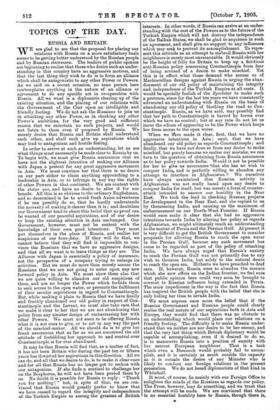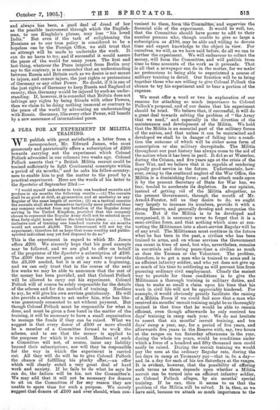When we Iltve made it clear, first, that we have
no aggressive intentions in Asia ; next, that we have abandoned our old policy as regards Constantinople; and finally, that we have not done so from any desire to make mischief, but purely because we realise our mistake, we can turn to the question of obtaining from Russia assurances as to her policy towards India. Would it not be possible for her to give us assurances 'that she has no wish to conquer India„ and is perfectly willing to abandon any attempt to interfere in Afghanistan ? We ourselves have always maintained that Russian activity in Afghanistan was not really based upon any desire to conquer India for itself, but was merely a form of counter- attack intended to answer our hostility in the Near East. We took the lead in checking Russian projects for development in the Near East, and she replied to us by threatening India, and causing us the maximum of embarrassment on our North-West Frontier. If Russia would once make it clear that she had no aggressive intentions towards India by altering her policy as regards Afghanistan, we might ultimately reach an understanding in the matter of Persia and the Persian Gulf. At present it is very difficult to get the British Government to consider proposals for allowing Russia to reach the open water in the Persian Gulf, because any such movement has come to be regarded as part of the policy of attacking India. We have always urged that Russia's anxiety to reach the Persian Gulf was not primarily due to any wish to threaten India, but solely to the natural desire to reach the open sea. Hitherto we have preached to deaf ears. If, however, Russia were to abandon the menace which she now offers on the Indian frontier, we feel sure that public opinion here could very soon be brought to consent to Russian influence being extended in Persia. The main impediment in the way is the fact that Russia has inspired the British people with the belief that she is only biding her time to invade India.
We must express once more the belief that if the Russian Government and Russian people could clearly realise the real nature of our aspirations both in Asia and Europe, they would find that there was no obstacle to an understanding which would place our relations on a friendly footing. The difficulty is to make Russia under- stand that we neither are nor desire to be her enemy, and that the very last thing which British diplomacy would be capable of accomplishing, even if it desired to do so, is to manceuvre Russia into a position of enmity with her nearest European neighbour. That is a task which even a Bismarck would probably fail to accom- plish, and it is certainly as much outside the capacity as it is outside the desire of any Minister who is likely to conduct our foreign relations in the present generation. We do not breed diplomatists of that kind in Whitehall.
It must, of course, lie mainly, with our Foreign Office to enlighten the minds of the Russians as regards our policy. The Press, however, °nay do something, and we trust that the attempt will be made. We are convinced that there is no essential hostility here to Russia, though there is, and always has been, a geed deal oU dread of her as the possible instrument through which the English- man,. to use Kingla.ke's phrase, May lose "his , loved India." But even if the task of enlightening the Russians as to our true policy is censidered to be a hopeless one by the Foreign Office, we still trust that an .attempt will be ' made to undertake the work. It can do no harm to try, and if successful it would assure the peace of the world for, many years. The first and last thing, whatever the Press inspired, from Berlin may say to the contrary, is to remember that an understanding between Russia and Britain such as we desire is not meant to injure, and cannot injure, the just rights or pretensions of Germany or any other Power. No doubt, if it is one 'of the just rights of Germany to keep Russia and England at enmity, then Germany would be injured by such an under- standing. If, however, it is conceded that Britain does not infringe any rights by being friends with other Powers, then we claim to be doing nothing immoral or contrary to the peace of the world by advocating an understanding with Russia. Germany, like every other Power, will benefit by a new assurance of international peace.
A PLEA FOR AN EXPERIMENT IN MILITIA TRAINING.
WE publish with great satisfaction a letter from a correspondent, Mr. Edward James, who most generously and patriotically offers a subscription of £200 towards carrying out the experiment which Colonel Pollock advocated in our columns two weeks ago. Colonel Pollock asserts that "a British Militia recruit could be trained sufficiently to fight Continental conscripts within a period of six months," and . he asks his fellow-country- men to enable him to put the matter to the proof by a practical experiment. Here are the words of his letter to the Spectator of September 23rd :— 1 "I would myself undertake to train one hundred recruits and produce in six months the following results :—(1) The recruits Shall be as good at drill, at gymnastics, and at musketry as any Regular of the same length of service ; (2) on a tactical exercise the recruits shall show themselves tactically more proficient than any company selected from any battalion of the Regular Army serving in the United Kingdom, provided that the company chosen to represent the Regular Army shall not be selected more than forty-eight hours before the trial takes place. . . . . . The inclusive cost of training one hundred recruits for six months would not exceed £3,500. The Government will not try the experiment ; therefore let us hope that some wealthy and public- spirited individual may yet feel disposed to do so."
This is the experiment in regard to which Mr. James offers £200. We sincerely hope that his good example may be followed, and we are glad to offer on behalf of the proprietor of the Spectator a subscription of £100. The £300 thus secured goes only a small way towards the 023,500 needed, but it is at any rate a beginning, and we can only . trust that in the course of the next few weeks we may be able to announce that the rest of the money has been provided, and that Colonel Pollock will be allowed to carry out his experiment. Colonel Pollock will of course be solely responsible for the details of the scheme and for the method of training. Needless to say, he will give his own services gratuitously. He will also provide a subaltern to act under him, who has like- wise generously consented to act without payment. But though Colonel Pollock must be responsible for what is done, and must be given a free hand in the matter of the training, it will be necessary to have a small organisation to manage the funds if they can be raised. What we suggest is that every donor of £100 or more should be a member of a Committee formed to woik the scheme, and to see that the money is applied to the purposes for which it is raised. Members of such a Committee will not, of course, incur any liability beyond their subscriptions, nor will they be responsible for the way in which the experiment is carried out. All they will do will be to give Colonel Pollock the chance of fulfilling his plucky orfer,—an offer which will clearly entail a very great deal of hard work and anxiety. If he fails to do what he says he can do, the failure will be his, not the Committee's. We may add that it will not be necessary for donors to sit on the Committee if for any reason they are unable to spare time for such a purpose. We merely isuggest that donors of £100 and over should, when con-



























































 Previous page
Previous page